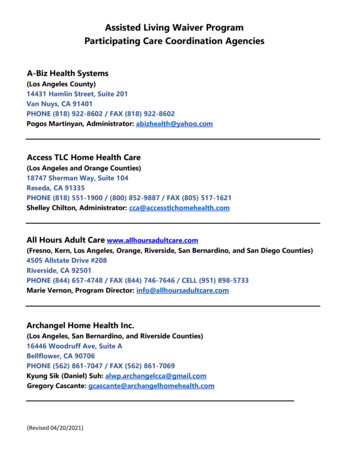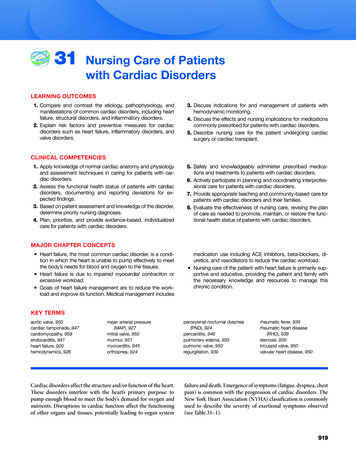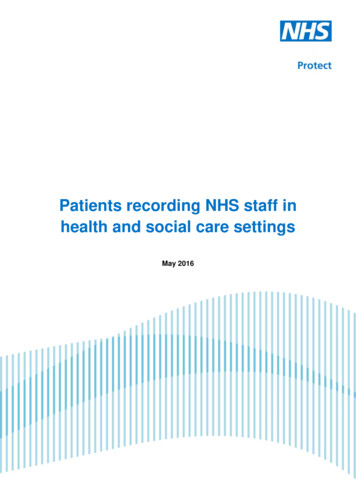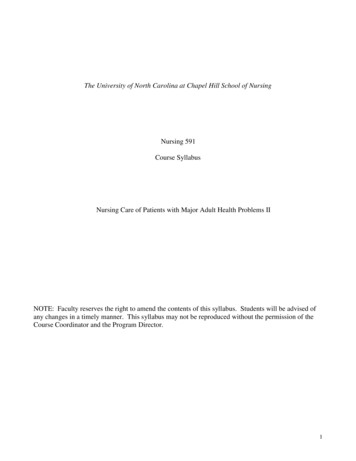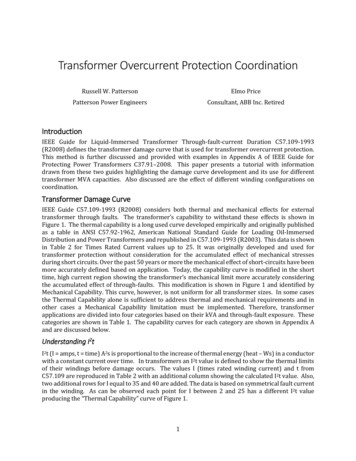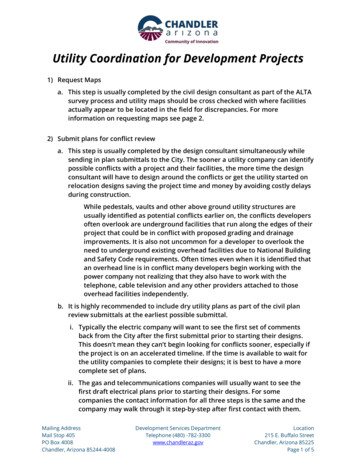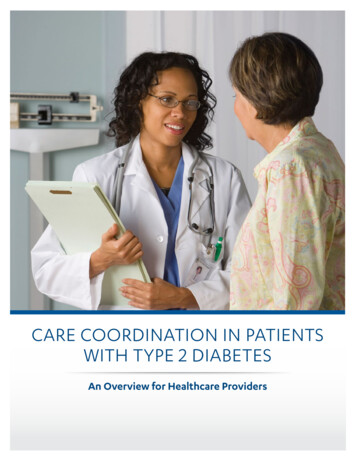
Transcription
CARE COORDINATION IN PATIENTSWITH TYPE 2 DIABETESAn Overview for Healthcare Providers
INTRODUCTIONAs you may know, patient-centered care and carecoordination of patients with complex conditions havegarnered increased attention from national qualityorganizations such as the Agency for Healthcare Researchand Quality (AHRQ) and the National Quality Forum (NQF).As a result, care coordination has emerged as a cornerstoneof quality healthcare.1,2The following document outlines potential approaches todelivering coordinated care to patients with complex needsincluding diabetes—some of which you may already bedoing. It is intended to provide an overview of the elementsof care coordination but is not intended to guide treatmentor replace clinical judgment.ESSENTIAL ELEMENTS OF CARE COORDINATIONIN PATIENTS WITH COMPLEX NEEDS, INCLUDING DIABETESAs you can attest, effective coordination of care addressesthe needs of each patient, with an increase in diseasecomplexity receiving an increase in appropriate care.Patient preference and degree of engagement in carecan also affect the need for care coordination.3The AHRQ’s key elements of delivering coordinated carefor patients with complex needs include1:1. Comprehensive needs assessment2. Individualized care planning3. Access to needed services and equipment4. Communication and monitoring2Care Coordination in Patients With Type 2 DiabetesCare CoordinationThe goal of care coordination is to helpensure that the needs and preferences ofeach patient and the family/caregivers areacknowledged and accounted for duringdevelopment of a comprehensive plan ofcare across providers, services, and settings.1,2
1 COMPREHENSIVE NEEDS ASSESSMENTConduct and regularly update acomprehensive needs assessment1Care coordination for patients with complex chronicconditions such as diabetes starts with a comprehensiveassessment that aims to identify all care needs andpreferences of the patient and family/caregivers toformulate the individualized care plan.1A comprehensive assessment starts with the patient datayou already have and adds additional factors addressed byany member of the care team.1Standard baseline information Care goals Medical history Complete physical exam Evaluation of medical diagnoses Family historyAdditional care coordination factors Updated care goals, if appropriate ssessment of patient daily functioningAwith/without additional support pdates that include patientUstatus changes New-onset comorbid conditions3Care Coordination in Patients With Type 2 DiabetesHow This May Impact Your PatientsWith Type 2 DiabetesCoordinate with the patient and multidisciplinaryteam to help ensure that the needs assessmentis periodically updated to include baseline andadditional factors such as individual patient needs,preferences and engagement level, new comorbidconditions, polypharmacy information, andpsychosocial concerns.1,4
2 INDIVIDUALIZED CARE PLANNINGCollaboratively develop and updatean individualized care plan 1You and other members of the care team may see thebenefits of collaborating to develop an individualized careplan that is easily accessible and reflects patient values andpreferences. You can help the team understand current andlong-term needs and goals for care as well as1: ypes and frequency of all health, rehabilitation,Tand mental health services ome care services and other servicesHthat may be needed I dentifying who is responsible for providingeach service ow to address medications prescribedHby multiple providers 4 ritical issues that may trigger revisionsCto the care planCare Coordination in Patients With Type 2 DiabetesHow This May Impact YourPatients With DiabetesWork with your patients and other healthcareproviders to individualize diabetes care to helpaddress aspects such as diabetes educationneeds and preferences, physical activitylevel, eating patterns, social/work/culturalfactors, existence of diabetes complications,psychosocial issues, and comorbid conditions.4,5
3 ACCESS TO NEEDED EQUIPMENT AND SERVICESFacilitate access to medical care,home and community-based services,and supports 1Patients with complex conditions require care coordinationfor a variety of health and long-term services and support,including assistive technology and durable medicalequipment, physical therapy, personal care assistance,transportation to get to medical appointments, and homedelivered meals. Some patients need help accessing publicbenefit programs, such as Medicaid or the SupplementalNutrition Assistance Program.1How This May Impact Your PatientsWith DiabetesFor appropriate patients, facilitate access toother diabetes care support services such asdiabetes self-management education (DSME),nutrition therapy, exercise instruction,and case management.5,6,74 COMMUNICATION AND MONITORINGRegularly monitor health status andcommunicate effectively1Successful care coordination is achieved when teammembers communicate effectively with the patient andshare relevant findings with each other and with you, theprescriber. In addition to standard forms of communication,electronic tools can also be employed, such as remotephysiologic monitoring, electronic data acquisition andreminders, networked electronic health records, patienteducation modules, and informed decision-making tools.15Care Coordination in Patients With Type 2 DiabetesHow This May Impact YourPatients With DiabetesEncourage continued monitoring andcommunication among patients, family/caregivers, and all providers to ensure adequateunderstanding of the diabetes care plan,patient self-care responsibilities (eg, glycemicassessment, foot care, lifestyle changes, etc),and the importance of adherence to therapy.1,4
SUMMARYCare coordination is fundamental to effective chroniccare management. It is a patient-centered model of carethat seeks to deliver the right care to the right patient atthe right time and ensure a patient’s needs, preferences,and individual goals are met over time.2Open communication among members of the careteam, the patient, and his or her family/caregivers anda comprehensive, individualized care plan are essentialelements of care coordination. Patients who sufferwith complex chronic conditions such as diabetes canbenefit from care coordination that emphasizes selfmanagement, goals, and support and encourages anopen dialogue between providers and patients.2Click Here To Insert Logo(pdf format)Click Here To Save PDFReferences: 1. Rich E, Lipson D, Libersky J, Parchman M. Coordinating Care for Adults With Complex Care Needs in the Patient-Centered Medical Home: Challenges and Solutions. Rockville, MD:Agency for Healthcare Research and Quality; 2012. AHRQ publication 12-0010-EF. 2. National Quality Forum. Quality Connections: Care Coordination. Washington, DC: National Quality Forum;October, 2010. 3. Meyers D, Peikes D, Genevro J, et al. The Roles of Patient-Centered Medical Homes and Accountable Care Organizations in Coordinating Patient Care. Rockville, MD: Agency forHealthcare Research and Quality; 2010. AHRQ publication 11-M005-EF. 4. American Diabetes Association. Standards of medical care in diabetes—2015. Diabetes Care. 2015;38(suppl 1):S1-S93.5. American Diabetes Association. National standards for diabetes self-management education and support. Diabetes Care. 2014;37(suppl 1):S144-S153. 6. American Diabetes Association. Nutritiontherapy recommendations for the management of adults with diabetes. Diabetes Care. 2014;37(suppl 1):S120-S143. 7. Colberg SR, Sigal RJ, Fernhall B, et al. Exercise and type 2 diabetes: AmericanCollege of Sports Medicine and the American Diabetes Association: joint position statement. Diabetes Care. 2010;33(12):e147-e167.CarePath Healthy Engagements is a comprehensive program designed to help improve the lives of peopleliving with type 2 diabetes and assist those that care for them. CarePathHealthyEngagements.comThis information has been developed by Janssen Pharmaceuticals, Inc., and made widely available to support patient and provider education. Janssen Pharmaceuticals, Inc. 2020August 2020cp-16494v26Care Coordination in Patients With Type 2 Diabetes
4 Care Coordination in Patients ith Type 2 iabetes 2 INDIVIDUALIZED CARE PLANNING Collaboratively develop and update an individualized care plan 1 You and other members of the care team may see the benefits of collaborating to develop an individualized care plan that is easily accessible and reflects patient values and preferences. You can help the team understand current andFile Size: 2MBPage Count: 6
